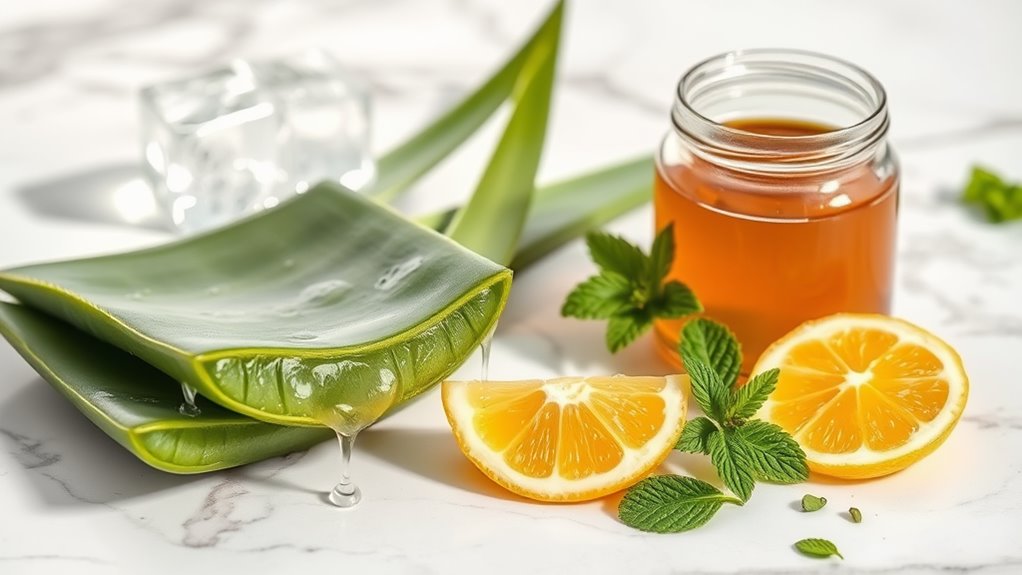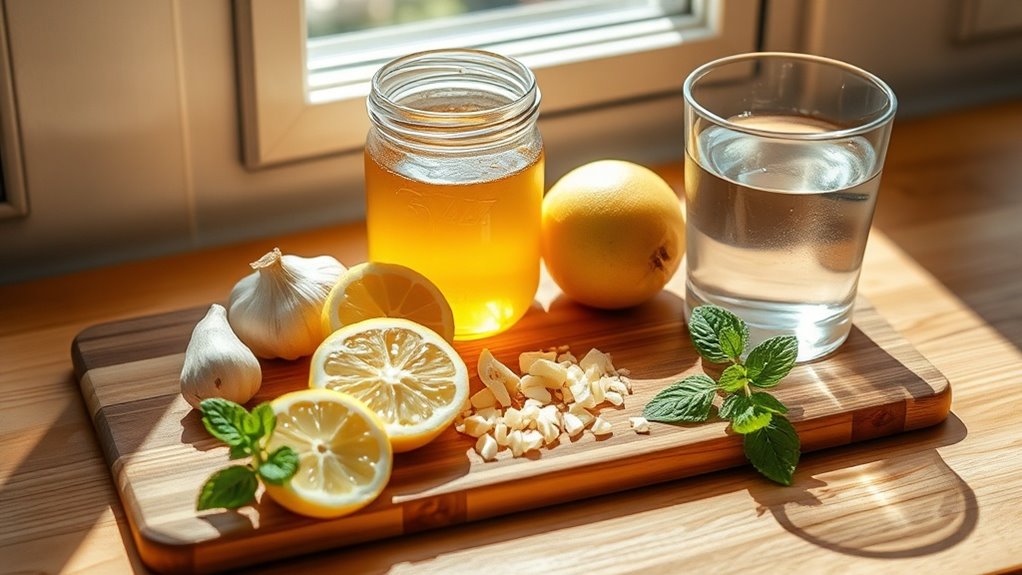Cold Remedies That Work Without Medication
When you’re feeling under the weather, you don’t always need to reach for over-the-counter medications. Your kitchen cabinets and garden likely hold numerous natural solutions that can ease cold symptoms and support your body’s healing process. From powerful plant compounds to time-tested home remedies, nature provides effective tools to combat congestion, soothe sore throats, and boost your immune system. Let’s explore these gentle yet potent alternatives that align with your body’s natural healing abilities.
Natural Remedies From Your Kitchen
When you’re battling a cold, your kitchen can become a natural pharmacy filled with immune-boosting ingredients. Reach for raw honey, which soothes sore throats and contains natural antibacterial properties.
Steep fresh ginger root in hot water for a powerful decongestant tea, or add turmeric for its anti-inflammatory benefits. Crushed garlic cloves release allicin, a potent cold-fighting compound. These time-tested cold remedies work synergistically with your body’s natural healing processes. Additionally, incorporating homemade chicken soup into your diet provides essential nutrients and hydration to aid recovery.
For extra support, sip on homemade vegetable broth loaded with onions, carrots, and medicinal mushrooms to strengthen your immune response.
Hydration and Rest Strategies
Although fighting a cold requires many natural approaches, proper hydration and adequate rest form the foundation of your body’s healing process.
You’ll need to prioritize water-rich fluids throughout the day and create ideal conditions for restorative sleep.
- Sip warm herbal teas like chamomile, elderberry, or ginger every two hours
- Keep a large water bottle by your bedside for easy nighttime hydration
- Create a dark, cool sleeping environment between 65-68°F
- Practice gentle breathing exercises before bed to clear nasal passages
- Set a consistent sleep schedule with 8-9 hours of rest while healing. Additionally, consider using immune-boosting essential oils in a diffuser to further enhance your recovery experience.
Steam Therapy and Nasal Care
Since ancient times, steam therapy has proven to be one of nature’s most effective decongestants for clearing stuffy nasal passages. You’ll find relief by breathing in warm, moist air infused with healing botanicals.
| Steam Method | Botanical Add-ins |
|---|---|
| Bowl & Towel | Eucalyptus Oil |
| Hot Shower | Peppermint Leaves |
| Facial Steamer | Thyme Sprigs |
| Neti Pot | Sea Salt |
| Essential Oil Diffuser | Lavender Oil |
For best results, inhale the steam for 10-15 minutes while keeping your eyes closed. Add a few drops of eucalyptus oil or fresh herbs to amplify the decongesting effects. Remember to blow your nose gently after each session to clear released mucus. Additionally, regular steam therapy can help reduce swelling in the nasal passages, enhancing overall comfort and airflow.
Immune-Boosting Foods and Drinks
Beyond clearing your airways with steam therapy, nourishing your body with the right foods and beverages can naturally strengthen your immune system to fight off a cold.
Focus on antioxidant-rich, whole plant foods that provide essential nutrients to support your body’s natural healing process.
- Sip ginger and turmeric tea with lemon and honey for its anti-inflammatory properties
- Load up on vitamin C from citrus fruits, berries, and bell peppers
- Eat garlic and onions raw or lightly cooked to access their antimicrobial compounds
- Include zinc-rich foods like pumpkin seeds, chickpeas, and leafy greens
- Stay hydrated with herbal teas, broths, and warm water with lemon. Elder flower tea, with its powerful antiviral compounds, has also been shown to combat respiratory infections effectively.
Essential Oils and Aromatherapy Solutions
While traditional medications can provide relief, essential oils offer a natural and aromatic approach to easing cold symptoms.
You’ll find eucalyptus oil particularly effective for clearing congested airways and reducing sinus pressure. Add a few drops to steaming water for a therapeutic inhalation session, or use it in a diffuser while you sleep.
Peppermint oil helps relieve headaches and open nasal passages, while tea tree oil’s antimicrobial properties can help fight infection.
Try lavender oil to reduce stress and promote restful sleep. For best results, combine these oils with a carrier oil like coconut or jojoba before applying them topically. Additionally, incorporating immune-boosting herbs such as ginger and turmeric in your routine can enhance the overall effectiveness of these essential oils.







